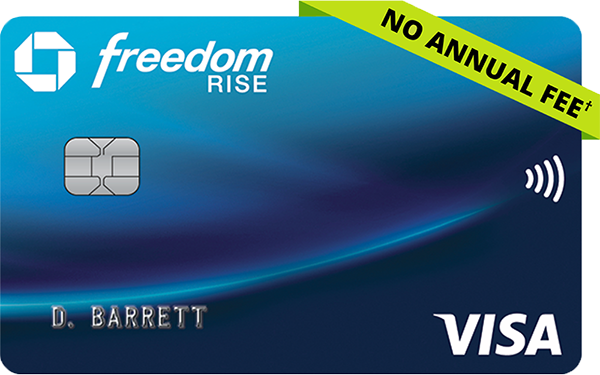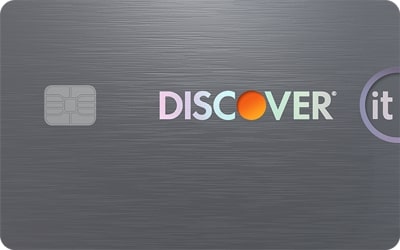Chase Freedom Rise: As Good As A Credit-Builder Card Gets
4.8
This is a best-in-class credit card for those looking to build credit while earning cash-back rewards. You can increase your odds of approval by pairing the card with a Chase checking account.
- No annual fee
- Earns rewards
- Reports to the three major credit bureaus
- High APR
- No bonus categories

$0
26.99% Variable APR
N/A
Annual fee
$0
Rewards rate
1.5%
Bonus offer
Earn a $25 statement credit after signing up for automatic payments within the first three months of opening your account.
Intro APR
N/A
Ongoing APR
APR: 26.99% Variable APR
Cash Advance APR: 29.99%, Variable
Penalty APR: Up to 29.99%
Balance transfer fee
$5 or 5% of the amount of each transfer, whichever is greater
Foreign transaction fee
3% of the amount of each transaction in U.S. dollars.
Detailed review: Chase Freedom Rise℠
The $0-annual-fee Chase Freedom Rise℠ — the newest member of the Chase Freedom family — is a standout among credit cards designed for building credit, for a variety of reasons.
For starters, it's an unsecured card (meaning you won't have to put down a security deposit), and it's gettable even if you have no credit history. On top of that, the Chase Freedom Rise℠ offers cardholders a competitive and uncapped 1.5% cash back on all purchases, with none of the recurring fees that plague other credit-builder cards. Applicants can even earn a small bonus for setting up automatic payments. That makes the card both cheaper and more rewarding than most of its competitors.
And if you later find yourself ready to move on to an even more rewarding credit card, you'll have a number of excellent potential upgrade options within Chase's large portfolio of products.
In short, the Chase Freedom Rise℠ ticks many important boxes for credit newbies — but it's not meant for those with bad credit (FICO scores of 629 or lower).
Chase Freedom Rise℠: Basics
Card type: Starter; credit builder.
Annual fee: $0.
Sign-up bonus: Earn a $25 statement credit after signing up for automatic payments within the first three months of opening your account.
Rewards:
Earn an uncapped 1.5% cash back on all qualifying purchases.
APR: The ongoing APR is 26.99% Variable APR.
Foreign transaction fee: 3% of the amount of each transaction in U.S. dollars.
Benefits and perks
No credit history required
The Chase Freedom Rise℠ is a true credit-builder credit card; you don't need an existing credit profile to qualify. Although it's an unsecured card and thus doesn't require an upfront deposit as collateral, applicants can increase their chances of approval by having or opening a Chase checking or savings account with a minimum balance of $250 within two days of applying. There is no minimum deposit balance required once approved, according to Chase.
You can qualify for a credit line increase in as little as six months by using your card responsibly and making on-time payments. That larger credit limit can, in turn, help your credit scores by lowering your credit utilization ratio.
While applications are available online, Chase is encouraging potential applicants to apply in a branch so they can speak to a banker and learn about educational tools that can help their credit and financial well-being.
It’s relatively light on fees
Credit-builder cards are sometimes loaded with exorbitant fees, but not the Chase Freedom Rise℠.
Aside from not requiring a security deposit, the card charges no recurring annual, monthly or administrative fees. That means you can start working on your credit without worrying about the impact on your wallet.
However, note that the card does charge certain standard one-time fees for specific transactions: paying late, making a purchase internationally, or initiating a balance transfer or cash advance, for example. And, of course, you'll want to pay off your balance in full each month to avoid interest charges.
Earn a competitive cash-back rate
The Chase Freedom Rise℠ fits the bill if you're hoping to earn rewards while building your credit profile. It offers an uncapped, no-fuss 1.5% cash back on all purchases.
Among cards for those just starting out, that's quite good, and it can help put some money back in your pocket while establishing credit.
Though it's touted as a cash-back card, rewards earned come in the form of Chase Ultimate Rewards® points. Points are worth 1 cent each when redeemed as cash back.
It has potential upgrade options
The Chase Freedom Rise℠ is part of the broader Chase Freedom family of credit cards. That means once you've bolstered your credit with the Rise card, you may have an eventual pathway to upgrade to a different Chase Freedom card with rewards or features that better fit your spending habits.
Upgrading your card (also known as a "product change") won't require a hard inquiry on your credit report. You'll also keep the same account number, so your average age of accounts will keep increasing. This is important, as hard inquiries and average account age are two factors in calculating your credit scores. (Keeping the same account number also means you avoid the hassle of having to update that number in places you've stored it for autopayments.)
You can earn a bonus for automatic payments
New cardholders can earn a $25 statement credit when they enroll in automatic payments within the first three months of account opening. This is similar to an introductory welcome offer, which many credit-builder cards don't offer.
While it's not a huge amount, this benefit helps set the Chase Freedom Rise℠ apart from competitors.
Drawbacks and considerations
You may need to consider opening a Chase bank account
According to Chase, applicants will have higher approval odds by pairing the Chase Freedom Rise℠ with a Chase checking or savings account and having at least $250 on deposit. Once approved, there is no minimum required deposit to keep in the account.
For qualified applicants, having access to that $250 gives the Chase Freedom Rise℠ an edge over a secured card, which typically requires a deposit but doesn’t let you actively withdraw that cash deposit while using the card. Still, if you're not interested in the possibility of banking with Chase, or if $250 seems too high of a bar, you could instead consider a card like the $0-annual-fee Capital One Platinum Secured Credit Card. It doesn't earn rewards and will require a security deposit — but you may qualify for a $200 credit line with an initial deposit of $49, $99 or $200, depending on your creditworthiness. You can also pay the deposit in installments (of at least $20), as long as you fund it in full within 35 days of approval. And you can do so via any eligible bank account; it doesn't have to be funded with a Capital One account.
You won’t want to carry a balance
As with most starter credit cards, the Chase Freedom Rise℠ doesn't feature any kind of 0% intro APR offer. The ongoing APR is 26.99% Variable APR%. That means interest payments may be tough to get ahead of if you carry a balance. Cardholders growing their credit profile should aim to use the Chase Freedom Rise℠ as an opportunity to build discipline in paying the statement balance each month to avoid those lofty interest payments. If you know you're likely to carry a balance, you may want to consider a credit union credit card. You'll likely have to take some steps to join the credit union before you can apply for any of its products, but ongoing APRs on credit union credit cards tend to be lower than those from larger banks.
It’s for building credit, not rebuilding it
While the Chase Freedom Rise℠ is a great card for building credit, you’ll likely need to look elsewhere if you’re trying to rebuild your credit. If, instead of no credit, what you have is poor credit (FICO scores of 629 or lower), consider a secured card like the $0-annual-fee Discover it® Secured Credit Card. There's a minimum security deposit of $200, but it earns rewards: 2% cash back at gas stations and restaurants on up to $1,000 in combined purchases each quarter. All other purchases earn 1%. There's also a unique bonus offer, which Discover phrases this way: "INTRO OFFER: Unlimited Cashback Match – only from Discover. Discover will automatically match all the cash back you’ve earned at the end of your first year! There’s no minimum spending or maximum rewards. Just a dollar-for-dollar match." Plus, Discover automatically reviews your account after seven months to determine whether you're ready to upgrade to an unsecured Discover card and get your deposit back.
If what you really have is bad credit (FICO scores of 629 or lower), then you're more likely to qualify for a secured credit card like this one. The minimum required deposit is $200, but there's no annual fee. Plus, you can earn rewards and a chance, eventually, to upgrade to a better unsecured product from Discover.
How to decide if it's right for you
The Chase Freedom Rise℠ is as solid as a credit-builder card gets. There’s no annual or monthly fee, no required minimum deposit after you’re approved, and you’ll earn a competitive cash-back rate while having options to upgrade the card later on. These features make the card a great option for people building credit.
Methodology
NerdWallet reviews credit cards with an eye toward both the quantitative and qualitative features of a card. Quantitative features are those that boil down to dollars and cents, such as fees, interest rates, rewards (including earning rates and redemption values) and the cash value of benefits and perks. Qualitative factors are those that affect how easy or difficult it is for a typical cardholder to get good value from the card. They include such things as the ease of application, simplicity of the rewards structure, the likelihood of using certain features, and whether a card is well-suited to everyday use or is best reserved for specific purchases. Our star ratings serve as a general gauge of how each card compares with others in its class, but star ratings are intended to be just one consideration when a consumer is choosing a credit card. Learn how NerdWallet rates credit cards.


